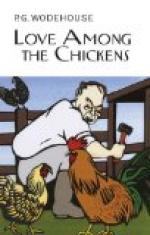I always like to think of Stanley Featherstonehaugh Ukridge as I saw him at that moment. There have been times during a friendship of many years when his conduct did not recommend itself to me. It has sometimes happened that I have seen flaws in him. But on this occasion he was at his best. He was eloquent. He dominated his audience. Long before he had finished I was feeling relieved that he had thought of sending Mrs. Ukridge indoors when he did, and Beale was hanging on his words with a look in his eyes which I had never seen there before,—a look of reverence, almost of awe, the look of a disciple who listens to a master.
He poured scorn upon his hearers, and they quailed. He flung invective at them, and they wilted. Strange oaths, learned among strange men on cattle-ships or gleaned on the waterfronts of Buenos Ayres and San Francisco, slid into the stream of his speech. It was hard, he said in part, it was, upon his Sam, a little hard that a gentleman—a gentleman, moreover, who had done so much to stimulate local trade with large orders and what not—could not run up to London for five minutes on business without having his private grounds turned upside down by a gang of cattle-ship adjectived San Francisco substantives who behaved as if the whole of the Buenos Ayres phrased place belonged to them. He had intended to do well by them. He had meant to continue putting business in their way, expanding their trade. But would he after what had occurred? Not by a jugful! As soon as ever the sun had risen and another day begun, their miserable accounts should be paid in full, and their connection with him cut off. Afterwards it was probable that he would institute legal proceedings against them in the matter of trespass and wholesale damage to property, and if they didn’t all end their infernal days in some dashed prison they might consider themselves uncommonly lucky, and if they didn’t make themselves scarce in considerably under two ticks, he proposed to see what could be done with Beale’s shot-gun. (Beale here withdrew with a pleased expression to fetch the weapon.) He was sick of them. They were blighters. Creatures that it would be fulsome flattery to describe as human beings. He would call them skunks, only he did not see what the skunks had done to be compared with them. And now they might go—quick!
* * * * *
We were quiet at the farm that night. Ukridge sat like Marius among the ruins of Carthage, and refused to speak. Eventually he took Bob with him and went for a walk.
Half an hour later I, too, wearied of the scene of desolation. My errant steps took me in the direction of the sea. As I approached, I was aware of a figure standing in the moonlight, gazing silently out over the waters. Beside the figure was a dog.
The dark moments of optimistic minds are sacred, and I would no more have ventured to break in on Ukridge’s thoughts at that moment than, if I had been a general in the Grand Army, I would have opened conversation with Napoleon during the retreat from Moscow. I was withdrawing as softly as I could, when my foot grated on the shingle. Ukridge turned.




